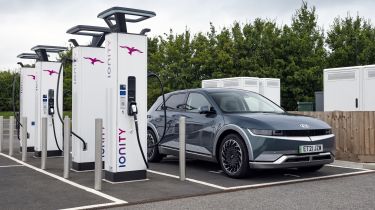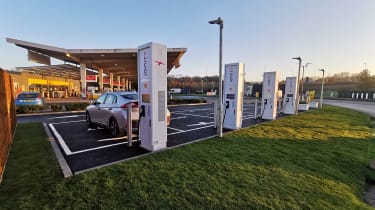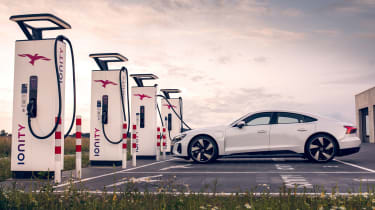Complete guide to the IONITY rapid-charging network
Manufacturer-backed IONITY rapid-charging network is expanding across the UK and Europe – here's all you need to know

IONITY was formed in 2017 following Shell’s acquisition of NewMotion – one of the largest charging providers in Europe –the IONITY rapid electric-vehicle charging network is now a joint venture involving Daimler (the parent company of Mercedes) along with BMW, Ford, Hyundai, Kia and the Volkswagen Group brands Porsche, Skoda and Audi.
The IONITY network operates across Europe, with 28 live locations in the UK and Republic of Ireland which contain a combined 198 active chargers, with 16 new locations currently being built as of May 2024. While that figure might seem small, the IONITY network is one of the very few that currently operates 350kW ultra-rapid chargers at all the stations. At those speeds, the latest electric cars like the Hyundai Ioniq 5 and Kia EV6 can recharge their batteries from 10-80% in less than 18 minutes.

Where can I find IONITY chargers in the UK?
The IONITY chargers are spread out all over the UK, you can find them anywhere from Aberdeen to Cornwall so you will never be too far away from one. A further five sites are operational in Ireland and 2 in Northern Ireland; the company's website features a map that plots both live and in-progress sites across the UK and Europe.
Several IONITY charging hubs are located at motorway service areas run by the Extra MSA Group. A few of these include the Leeds Skelton Lake (M1, J45), Cambridge (A14/M11, J28), Cobham (M25), Beaconsfield (M40, J2), Cullompton (M5, J28), Baldock (A1M, J10) and Peterborough (A1M, J17) locations.

How much does charging cost on the IONITY network?
Previously, the IONITY network had charged a flat fee of £8 for all charging sessions, regardless of how much electricity drivers consumed. However, since January 2020, customers without contracts have been charged an ad-hoc rate; as of May 2024, this stands at 74p per kWh. Those who access the network through manufacturer contracts from the likes of Audi, Mercedes, BMW, Porsche and most recently Rimac getting cheaper rates.
If you’re someone who covers long distances frequently and are therefore more prone to using rapid points to top your electric vehicle, you can sign up for an ‘IONITY Passport’ which has recently been reduced from £10.99 to £5.49 per month. Those who sign up for the annual subscription pay just 56p per kWh when recharging from one of IONITY’s units.
Energy company Octopus provides the electricity for every IONITY charger in the UK. The firm promises "100% renewable energy", giving driver's "peace of mind" regarding their impact on the environment.

The IONITY network in Europe
In November 2021, it was announced the IONITY network is set to include nearly 7,000 points spread over 1,000 locations by 2025 thanks to a €700 million investment – at the time of writing, there's already around 624 charging locations across the continent, with a total of 3718 chargers and a further 95 currently undergoing construction. The firm plans to feature between six and 12 points at each new site it opens, while more charging points will be added to its busier existing locations.
As part of the network expansion, IONITY is also planning to build its own service stations – like Gridserve’s 'Electric Forecourts'. CEO Michael Hajesch has unveiled a concept for these, called OASIS (picture above). However, there’s been no word yet on where these stations will be located, or when the first will open.
In 2021, IONITY added ‘Plug and Charge’ functionality to all of its chargers in Europe, with the aim of simplifying the charging process. Instead of getting out your credit or debit card, IONITY chargers are now able to automatically recognise electric cars registered with the scheme once they’re connected. The system uses digital certificate authentication to verify the information, and to protect your payment information.
Drivers are only charged for the electricity used once the charging cable has been disconnected, with the billing process also being automated. The list of electric cars compatible with the Plug and Charge service is constantly expanding with brands such as BMW and Genesis announcing that it will be available soon on their electric cars. A few cars currently able to use this function include the Porsche Taycan, Mercedes EQS, Ford Mustang Mach-E, Audi Q4 e-tron, Skoda Enya and Volkswagen ID.3. To check if your car is eligible consult your local dealership.
Need an EV that'll go the distance? Check out our list of the top 10 longest range electric cars
